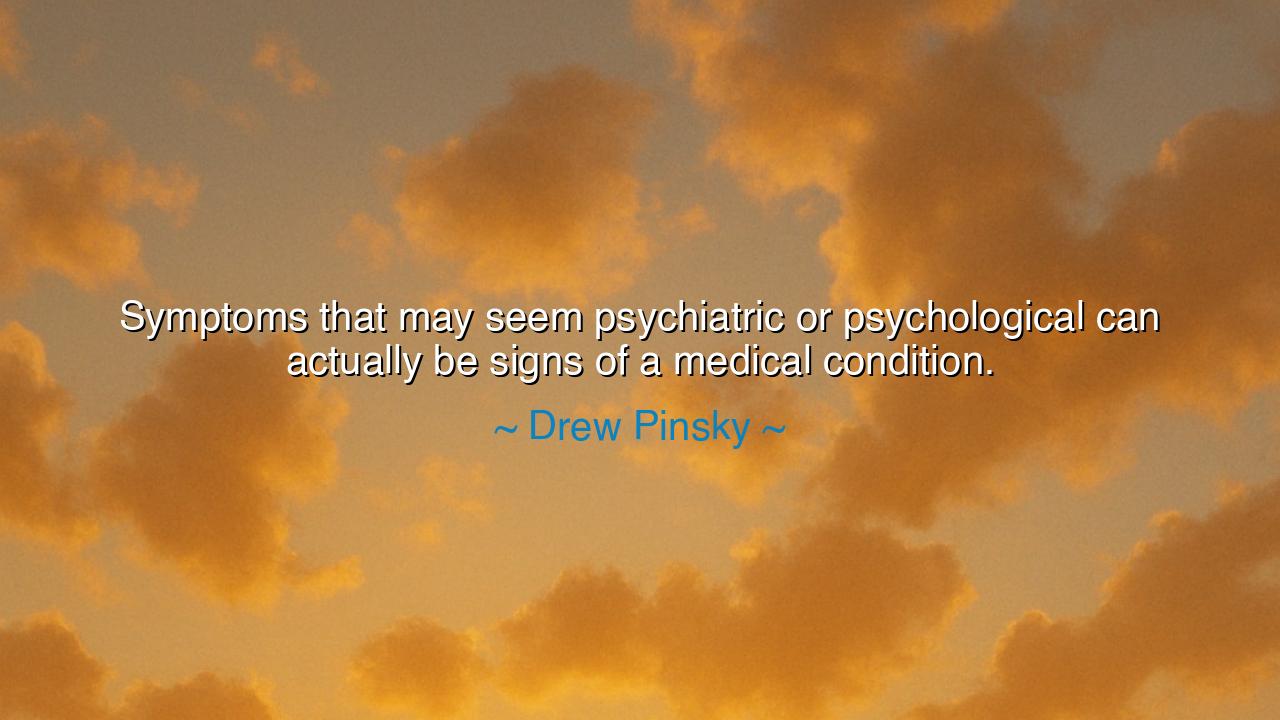
Symptoms that may seem psychiatric or psychological can actually
Symptoms that may seem psychiatric or psychological can actually be signs of a medical condition.






In the words of Drew Pinsky, the truth resounds with quiet urgency: “Symptoms that may seem psychiatric or psychological can actually be signs of a medical condition.” These words pierce through centuries of misunderstanding, reminding us that the human being is not a collection of separate parts but a harmony of body, mind, and spirit. In the ancient temples of healing, such as those of Asclepius in Greece or the great houses of medicine in Egypt, healers once knew this unity well. They looked upon suffering as a single flame — sometimes burning in the flesh, sometimes in the spirit — but always one fire. Yet through time, modern minds began to divide what was once whole, separating the mind from the body as if one could live without the other.
To understand Pinsky’s wisdom is to see that the mind often cries out on behalf of the body. Anxiety, confusion, or sadness may not be born of the heart’s weakness, but of unseen imbalance — of hormones adrift, of an organ in distress, of a deficiency calling out through emotion. The body speaks in mysterious tongues, and when we mistake its language, we misjudge its message. What appears as madness may be malady, and what seems like despair may be the whisper of a body asking for care. Thus, to heal the mind, one must first listen to the body, for it is the vessel through which the soul’s light burns.
There was once a woman in the early 20th century, known only in the records as Sarah, who suffered for years from what doctors called “melancholia.” She wept without reason, feared shadows, and could no longer speak of joy. They treated her as one possessed by sadness itself. But a young physician, less seasoned yet more curious than the rest, ordered a simple test — and found that her thyroid had ceased to serve her. Once treated, her mind lifted like mist under the morning sun. The madness was never madness at all — it was the body’s silent rebellion, misunderstood by those who saw only her tears.
This story, like countless others, shows that the line between mind and matter is but an illusion. When the ancients spoke of “humors” and “vital forces,” they did not have our machines or microscopes, but they understood this unity better than many do now. They saw that imbalance in one realm would echo in another, and that every emotion has a physical echo, every physical ailment a shadow in the soul. To deny this harmony is to blind oneself to the full truth of human suffering. Pinsky’s quote is not merely a medical statement — it is a call to return to holistic vision, to once again see the patient as a whole being.
Consider also the story of King Saul in the ancient scriptures, whose spirit was troubled beyond measure. Many called it madness or divine punishment. Yet some scholars, centuries later, have wondered — could his torments have been born from illness of the body, not curse of the heavens? Could imbalance in the blood or decay in the mind have turned his moods into storms? If so, then Saul stands as a tragic reminder of how misjudgment of the unseen can turn suffering into exile, and misunderstanding into shame.
From this teaching emerges a powerful lesson: before labeling another’s struggle as psychological, look deeper. The trembling hand, the sleepless night, the restless fear — these are not always the songs of the spirit alone. They may be the pulse of the body out of tune, a chemical river that has run dry, a silent inflammation that clouds thought like smoke in a temple. Compassion begins not with diagnosis, but with humility — the humility to say, “Perhaps I do not yet see the whole.”
So let us carry this wisdom into our lives: when we or those we love seem lost in the maze of the mind, seek the truth beneath appearances. Do not let shame or ignorance divide the physical from the emotional, for they are one tapestry, woven by the same divine hand. Approach suffering not with judgment, but with wonder — and remember that healing begins with listening, truly listening, to the entire being. For in that act of listening, we honor both the wisdom of the body and the mystery of the soul.






AAdministratorAdministrator
Welcome, honored guests. Please leave a comment, we will respond soon